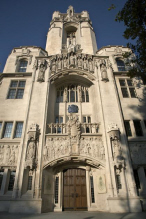If refusing Bert & Ernie isn’t discrimination, what is?
- Details
 The Supreme Court has decided that a bakery’s refusal to bake a cake with a slogan promoting gay marriage was not sexual orientation discrimination. Phil Allen analyses the ruling, including its impact on employment law.
The Supreme Court has decided that a bakery’s refusal to bake a cake with a slogan promoting gay marriage was not sexual orientation discrimination. Phil Allen analyses the ruling, including its impact on employment law.
The (perhaps surprising) outcome in the case of Lee v Ashers Baking Company Ltd & Ors (Northern Ireland) [2018] UKSC 49 overturns the decision of the Court of Appeal. The case considers some interesting issues about the protection afforded by discrimination law, but in reality, it is unlikely to fundamentally change things for UK employers.
The facts
The Claimant in this case, who is a gay man, was associated with an organisation called ‘QueerSpace’ a volunteer-led organisation for the lesbian, gay, bisexual and transgendered community in Northern Ireland. He decided to purchase a cake for a private event he was attending to mark the end of Northern Ireland anti-homophobia week and to mark the political momentum towards legislation for same sex marriage. He asked Ashers Bakery to produce a cake bearing the Queerspace logo, the slogan ‘Support Gay Marriage’ and an image of famous duo Bert and Ernie from Sesame Street. He paid for the cake and was given a receipt. However, he later received a call to state that, as a Christian company, Ashers Bakery was not able to fulfil the order. The Claimant made a complaint of discrimination which succeeded in the County Court and the Northern Irish Court of Appeal. However, the Supreme Court has overruled these decisions, holding that the shop’s refusal to fulfil the order was not unlawful discrimination.
The decision
The Judgment focuses on an important distinction. The shop was not refusing to produce a cake for the customer because of his protected characteristics (which would have been direct discrimination). It was refusing to produce a cake with a particular message. Provided the business would have refused to produce the same cake for anyone (regardless of their sexual orientation or other protected characteristics) it was not unlawful discrimination to refuse the order. The Court acknowledged that there may be debatable cases where it is unclear which side of the factual line the situation falls - but legally the distinction is fundamental.
The case also considered associative discrimination. This is the legal protection which means an individual cannot be less favourably treated because someone with whom they are connected has a protected characteristic (for example, if a claimant has a gay son or daughter). The Supreme Court has said that for this to apply the law requires a closer connection than existed in this case. The slogan requested was potentially for the benefit of all, not just a person or even just a small group.
Similarly the Court refused to accept that this refusal was indissociable (that is really inseparable from) the protected characteristic. That argument only exists where the reason given is a proxy for the characteristic. For example, in the 2013 case of Bull v Hall, cited extensively in the Ashers Bakery Judgment, the Supreme Court held that the policy of Mr. and Mrs. Bull to only let double bedrooms in their hotel to married couples because of their strongly held Christian beliefs was direct discrimination against a same-sex couple (who at the time were not permitted to marry). The Court in the Ashers bakery case observed that support for gay marriage is not a proxy for any particular sexual orientation. However, arguably, if a bakery refused to make a wedding cake with two male figures, this might fall on the other side of the line. It will be very difficult in practice to establish when this argument can be used.
What does this mean for me?
This case is very important for discrimination in the provision of goods and services to the public. You are generally now able to refuse to produce bespoke items containing messages with which you do not agree, provided you would refuse to do so for all and not just a particular customer (or one who shares his/her characteristics). For example, a printing business might choose to refuse to produce posters or promotional material which carries a racist or otherwise inflammatory message and rely on this case to support that decision.
However, many discrimination lawyers and HR practitioners will have conflicting feelings about this case. While the Supreme Court held that, legally, refusing this order was not discrimination, it seems to go against the spirit of discrimination law to refuse to fulfil an order that is related to a protected characteristic. Following the example of Ashers Bakery would, at the very least, be likely to result in adverse publicity and loss of business. As well as the risk of a claim from the disappointed customer, you might also face claims from employees who are upset by what they perceive to be discriminatory practice (although it is not really clear how such claims will be impacted by this judgment). Any decision to refuse service must be taken with care and consideration. If in doubt, please do speak to us.
This case is less obviously important for employment issues and will not change day-to-day decisions. We will need to see future cases decided before we know what it really means. Employees often assert that, because a decision is in some way related to issues around sexual orientation, religion or belief, or another protected characteristic, it must be discriminatory. This case illustrates that discrimination protection is far more complex than that.
Comment
Some key parts of this Judgment are unique to Northern Irish law (and this article does not address those issues). However the Court addresses the human right to freedom of thought, conscience and religion, and how that impacts upon what someone can be obliged to do. The Judgment contains a notable shift in emphasis in the law towards ensuring people are not obliged to produce something promoting a message with which they profoundly disagree (within limits). The wider impact of this is as yet unclear.
Many of you may have experience of situations where an employee refuses to perform a particular workplace task because they feel that it conflicts with their personal values. In most cases it will be reasonable to insist, sensitively but firmly, that the employee carries out a reasonable management instruction that reasonably falls within the ambit of their role. However, where such a refusal is grounded in the employee’s religious belief this case may make it harder to insist that employees must be actively involved in tasks that actively promote something with which the employee disagrees. If you find this issue arising with your workers, please do tread carefully and take advice.
Phil Allen is a partner in the Weightmans Employment Pensions and Immigration Team. He can be contacted on 0161 233 7330 or
Head of Legal Services / Deputy Monitoring Officer
Governance Officer/Company Secretary
Locums
Poll

















